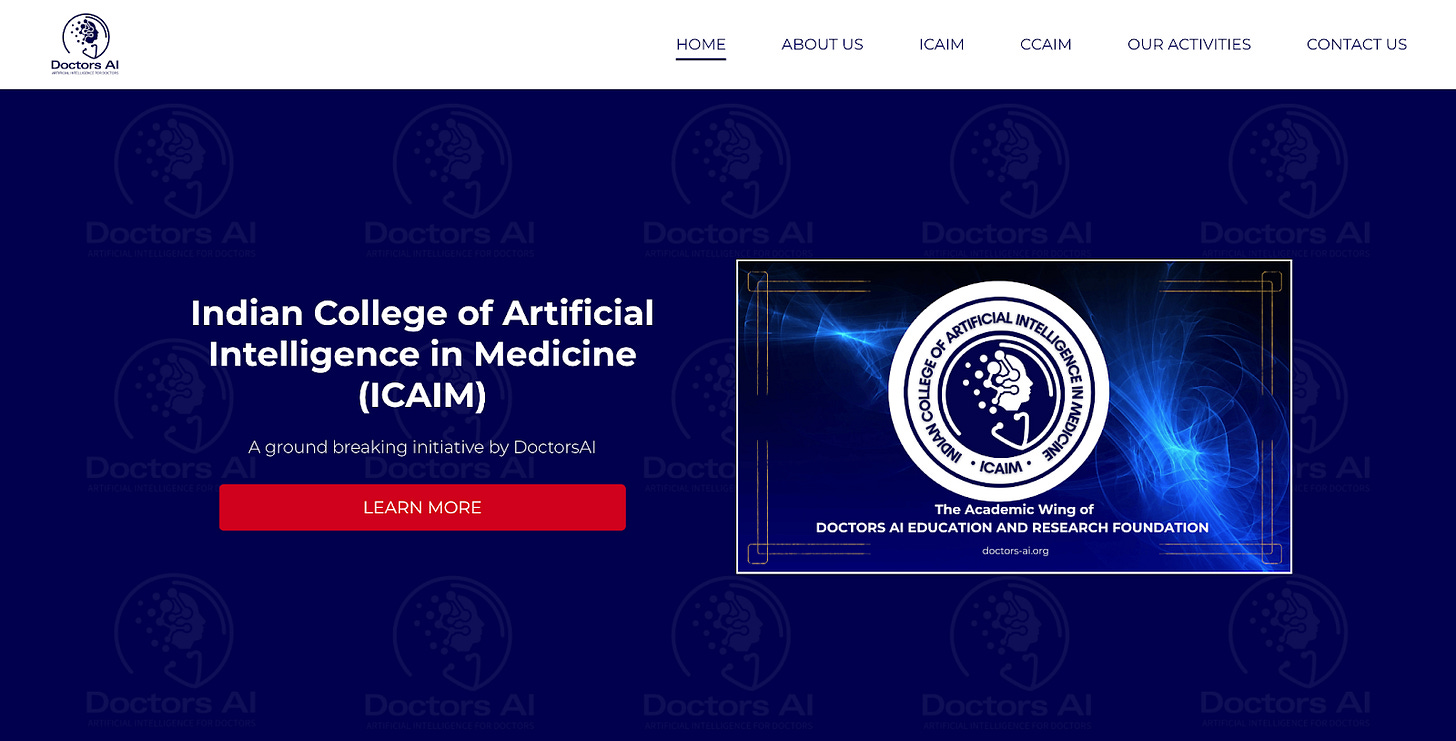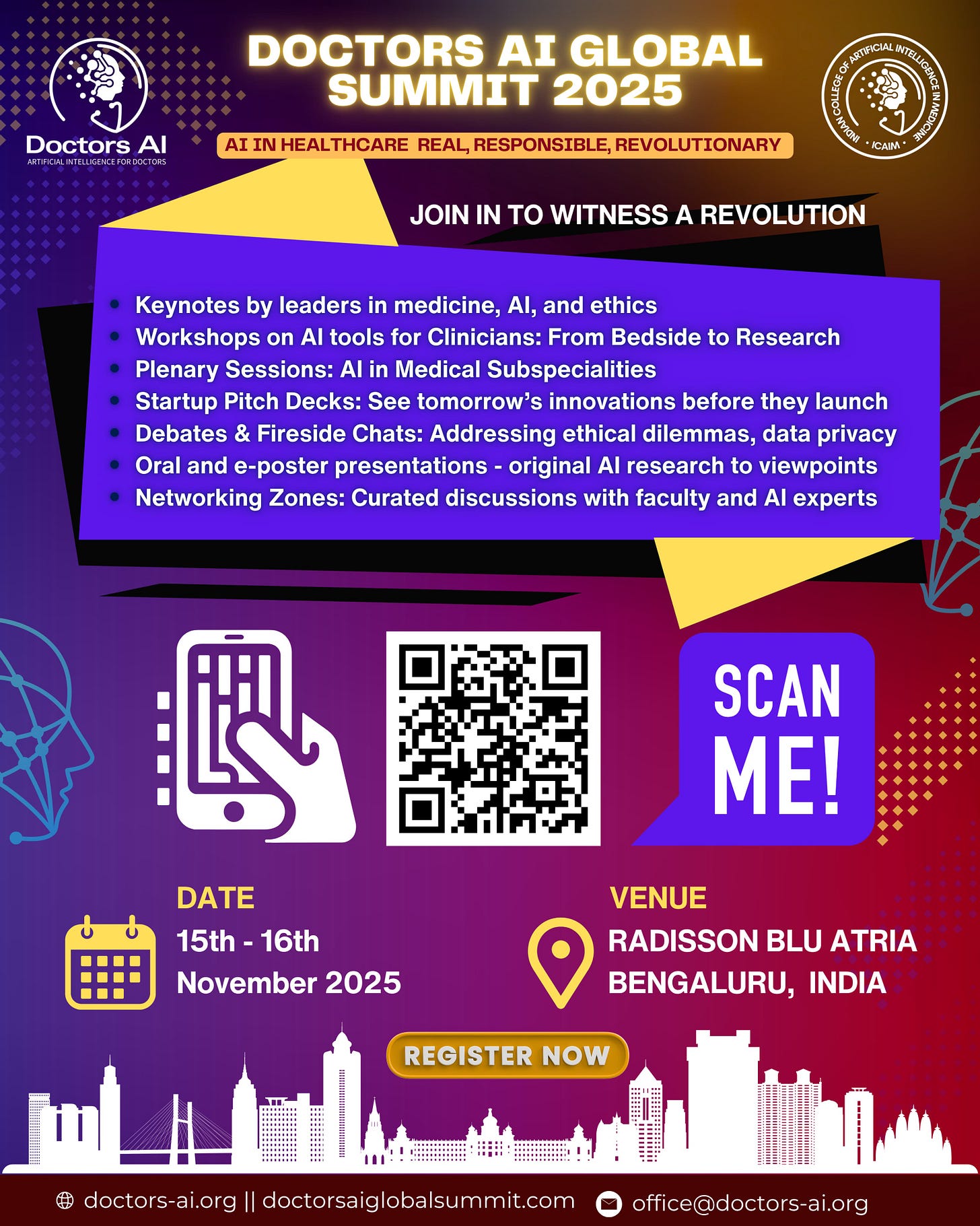Learn
Multinational Attitudes Toward AI in Health Care and Diagnostics Among Hospital Patients
This is an important study that survey’s hospital patients’ attitudes toward the use of artificial intelligence (AI) in health care across diverse socio demographic contexts. This cross-sectional study developed and implemented an anonymous quantitative survey between February 1 and November 1, 2023, using a nonprobability sample at 74 hospitals in 43 countries. Participants included hospital patients 18 years of age or older who agreed with voluntary participation in the survey presented in 1 of 26 languages. The primary outcome was participant responses to a 26-item instrument containing a general data section (8 items) and 3 dimensions (trust in AI, AI and diagnosis, preferences and concerns toward AI) with 6 items each.
In total, 13 806 patients participated. Their median (IQR) age was 48 (34-62) years, and 6973 (50.5%) were male. The survey results indicated a predominantly favorable general view of AI in healthcare, with 57.6% of respondents (7775 of 13 502) expressing a positive attitude. However, attitudes exhibited notable variation based on demographic characteristics, health status, and technological literacy. Female respondents (3511 of 6318 [55.6%]) exhibited fewer positive attitudes toward AI use in medicine than male respondents (4057 of 6864 [59.1%]), and participants with poorer health status exhibited fewer positive attitudes toward AI use in medicine (eg, 58 of 199 [29.2%] with rather negative views) than patients with very good health (eg, 134 of 2538 [5.3%] with rather negative views). Conversely, higher levels of AI knowledge and frequent use of technology devices were associated with more positive attitudes. Notably, fewer than half of the participants expressed positive attitudes regarding all items pertaining to trust in AI. The lowest level of trust was observed for the accuracy of AI in providing information regarding treatment responses (5637 of 13 480 respondents [41.8%] trusted AI). Patients preferred explainable AI (8816 of 12 563 [70.2%]) and physician-led decision-making (9222 of 12 652 [72.9%]), even if it meant slightly compromised accuracy.
Findings indicate that tailored AI implementation strategies should take patient demographics, health status, and preferences for explainable AI and physician oversight into account.
Connect
Register today to join us on June 25, 2025; 11 am – 12 noon ET ( 8:30 – 9:30 PM India time) for the BrainX Community Live event featuring Dr. Avneesh Khare, Dr. Amit Kumar Dey , Dr. S.V. Kulkarni, Maj (Dr) Ashlesha Tawde-Kelkar. The sessions features DoctorsAI and is themed on continuous AI learning opportunities for healthcare professionals.
Register here for the free Zoom event: https://us02web.zoom.us/meeting/register/MkOxLL0lTNa-g5d11nTOQA#/registration
Related publication: Mathur P, Arshad H, Grasfield R, et al. (October 27, 2024) Navigating AI: A Quick Start Guide for Healthcare Professionals. Cureus 16(10): e72501. doi:10.7759/cureus.72501
Datasets
Artificial Intelligence in Healthcare: 2024 Year in Review Dataset
A dataset based on PubMed search of 28,180 total articles; 1,693 were initially labeled mature, after which 1,551 articles were analyzed after exclusions.The most prevalent specialties within our PubMed search originated from imaging (407), head and neck (127), and General (122). Analysis of AI model types showed that the Large Language Model (LLM) was the most popular utilized in 479 publications, followed by AI General (448), and DL (372). Qualitative data was obtained on the data types, and it was revealed that the image data was predominant and used in 57.0% of the mature sources, followed by text (33.1%), followed by tabular (7.59%). The utilization of Large Language Models (LLMs) is the highest in publications associated with education at 18.6%, followed by General at 13.6%.
This study examined the relationships between coping styles, stress levels, and pain levels in lung cancer patients, and whether these relationships were moderated by place of residence (small town vs large city). A sample of 97 lung cancer patients completed questionnaires measuring coping styles (Stress Coping Inventory), perceived stress levels (Perceived Stress Scale), and pain levels (Short Form McGill Pain Questionnaire).
The survey was administered to a nonprobability convenience sample at 74 COMFORT network hospitals across 43 countries.In total, 13 806 patients participated, including 8951 (64.8%) in the Global North and 4855 (35.2%) in the Global South. Their median (IQR) age was 48 (34-62) years, and 6973 (50.5%) were male. The survey instrument consisted of 3 dimensions: trust in AI, AI and diagnosis, and preferences and concerns toward AI, each with 6 items, complemented by a general data section with 8 items (self-reported gender, age, highest educational level, weekly use of technological devices, health status, AI knowledge, and general attitudes toward AI use in medicine and health care).
Hillel Yaffe Glaucoma Dataset (HYGD)
The Hillel Yaffe Glaucoma Dataset (HYGD) addresses a critical limitation in existing GON datasets: the lack of gold-standard annotations. The dataset was curated by the Hillel Yaffe Ophthalmology Department Glaucoma Unit, Hadera, Israel, between 2022-2024. The dataset consists of 747 DFIs, including:548 glaucomatous DFIs (73%) and 199 non-glaucomatous DFIs (27%). HYGD’s labels are based on comprehensive ophthalmic examinations, including visual acuity assessment, intraocular pressure measurement, optical coherence tomography (OCT), visual field tests, and at least one year of follow-up monitoring.The dataset is structured to include both the DFIs and a labels file containing patient IDs, GON classifications and image quality scores. All DFIs were taken using a TOPCON DRI OCT Triton retinal camera with a 45° FOV and underwent deidentification and standardization processing.
Conferences
Additional BXC-featured publications
Surgery
Berk B. Ozmen, Nishant Singh, Kavach Shah, Ibrahim Berber, Damanjit Singh, Eugene Pinsky, Antonio Rampazzo, Graham S. Schwarz
Course
University of Florida
Anesthesiology/Surgery/Critical Care
Artificial intelligence for the prediction of postoperative complications in the critically ill
Vanessa Moll, Ashish K Khanna , Piyush Mathur
Surgery
Berk B. Ozmen, Piyush Mathur
Critical Care/General/Generative AI/LLM
Supreeth P. Shashikumar, Sina Mohammadi, Rishivardhan Krishnamoorthy, Avi Patel, Gabriel Wardi, Joseph C. Ahn, Karandeep Singh, Eliah Aronoff-Spencer & Shamim Nemati
Join and follow the BrainX community!
Webpage: https://brainxai.org/
Newsletter: https://brainxai.substack.com/subscribe
LinkedIn: https://www.linkedin.com/groups/13599549/
Youtube: https://www.youtube.com/channel/UCua5EiLL6I29hpNrJsdv1rg




